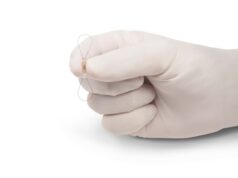 The Valvosoft non-invasive ultrasound therapy (NIUT) device for the treatment of severe symptomatic calcific aortic stenosis, met the primary endpoint in its pivotal study and improved or stabilised heart failure symptoms for 80.5% of patients, Cardiawave, the company behind the device, announced.
The Valvosoft non-invasive ultrasound therapy (NIUT) device for the treatment of severe symptomatic calcific aortic stenosis, met the primary endpoint in its pivotal study and improved or stabilised heart failure symptoms for 80.5% of patients, Cardiawave, the company behind the device, announced.
These outcomes were presented at TCT 2024 (27–30 October, Washington, DC, USA) by Hélène Eltchaninoff (Rouen University Hospital, Rouen, France).
Valvosoft is designed to non-invasively restore leaflet mobility in a stenotic aortic valve and widen the valve opening to relieve patient heart failure symptoms. High-intensity focused ultrasound waves micro-fracture calcification embedded in aortic valve leaflets without damaging tissue. The treatment is designed to be repeatable over time, as needed, to manage disease progression.
“The Valvosoft pivotal study demonstrated the ability of this novel ultrasound therapy to improve patient haemodynamics and quality of life entirely non-invasively. This therapy has the potential to offer a paradigm shift in the lifetime management of aortic stenosis,” said Christian Spaulding (European Hospital Georges Pompidou AP-HP, Paris, France), coordinating investigator of the Valvosoft pivotal study. “Aortic stenosis is progressive and threatens the lives of many millions of people each year. With the disease on the rise due to a rapidly aging population, new alternatives are needed for patients who cannot or do not want to undergo current valve replacement techniques. The Valvosoft technology holds the possibility to be an important and unique addition to our armamentarium to address progression of this deadly disease.”
In the study, 91.7% of patients were free of major adverse cardiac events (MACE) at 30 days, thus achieving the primary endpoint objective of <25%. There were no incidences of stroke through six months.
Valvosoft demonstrated the ability to reverse or slow disease progression, improving or stabilising New York Heart Association (NYHA) class for 80.5% of patients compared to baseline at six months. Quality of life also consistently improved over that time, with patients showing an average Kansas City Cardiomyopathy Questionnaire (KCCQ) score improvement of 8.7 points over baseline.
Improvements in haemodynamics were also reported. Aortic valve area (AVA) increased by 12% over baseline by six months post-procedure, in a patient population where 40% of patients were classified with very severe aortic stenosis and 31% were aged 90 or older.
Although the study did not include a control group, when the AVA measures were compared to the expected AVA among untreated patients based on natural disease progression, the AVA improvement was shown to be 21.4%. The mean pressure gradient decreased by 6% compared to baseline at six months; when compared to natural disease progression, that improvement reached -13.2%.
The Valvosoft Pivotal Study is a prospective, multicentre, single-arm study encompassing 60 patients with severe symptomatic CAS treated with Valvosoft NIUT at 11 European centres.










